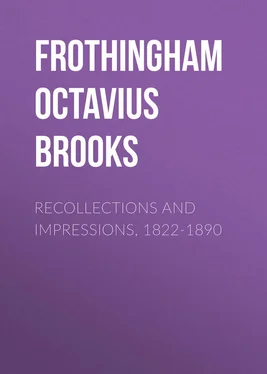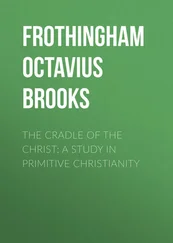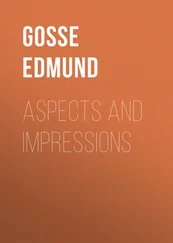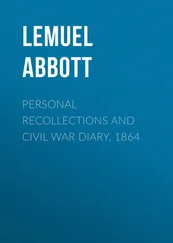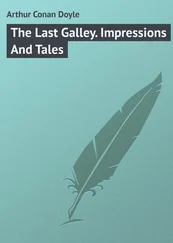Octavius Frothingham - Recollections and Impressions, 1822-1890
Здесь есть возможность читать онлайн «Octavius Frothingham - Recollections and Impressions, 1822-1890» — ознакомительный отрывок электронной книги совершенно бесплатно, а после прочтения отрывка купить полную версию. В некоторых случаях можно слушать аудио, скачать через торрент в формате fb2 и присутствует краткое содержание. Жанр: foreign_antique, foreign_prose, на английском языке. Описание произведения, (предисловие) а так же отзывы посетителей доступны на портале библиотеки ЛибКат.
- Название:Recollections and Impressions, 1822-1890
- Автор:
- Жанр:
- Год:неизвестен
- ISBN:нет данных
- Рейтинг книги:3 / 5. Голосов: 1
-
Избранное:Добавить в избранное
- Отзывы:
-
Ваша оценка:
- 60
- 1
- 2
- 3
- 4
- 5
Recollections and Impressions, 1822-1890: краткое содержание, описание и аннотация
Предлагаем к чтению аннотацию, описание, краткое содержание или предисловие (зависит от того, что написал сам автор книги «Recollections and Impressions, 1822-1890»). Если вы не нашли необходимую информацию о книге — напишите в комментариях, мы постараемся отыскать её.
Recollections and Impressions, 1822-1890 — читать онлайн ознакомительный отрывок
Ниже представлен текст книги, разбитый по страницам. Система сохранения места последней прочитанной страницы, позволяет с удобством читать онлайн бесплатно книгу «Recollections and Impressions, 1822-1890», без необходимости каждый раз заново искать на чём Вы остановились. Поставьте закладку, и сможете в любой момент перейти на страницу, на которой закончили чтение.
Интервал:
Закладка:
Octavius Brooks Frothingham
Recollections and Impressions, 1822-1890
I.
PARENTAGE
My father was, as I have said elsewhere, a clergyman in Boston, Massachusetts, a Unitarian minister to the First Church, standing in a long line of men, of whom the earliest was severely orthodox, while he abhorred orthodoxy. Yet he was ordained without hesitation, was more than acceptable to the best minds through a service of thirty-five years, and continued more and more unorthodox to the end; so gradually and insensibly did the Puritan tenets disappear one by one until the shadow of them only remained. We are assured that by 1780 nearly all the congregational pulpits were filled by Arminians. In 1815, the year of my father's ordination, they were well domesticated in New England, Calvinism having lost its hold on the minds of thinking people, and none but keen-eyed watchers on the tower seeing what course opinion was taking. How far the tendency towards the moral and practical view of religion as distinct from the speculative view had gone, is well illustrated in my father's case. He was a man of excellent education, one of the best scholars in a distinguished class at Harvard, an enthusiast for intellectual cultivation, singularly refined in perception, an acute critic, a careful, precise, elegant writer. His tastes were pre-eminently literary. This is said in full view of the fact that he was a learned theologian, a pungent disputant, a zealous student of biblical researches, a faithful pastor.
He was essentially a man of letters. His passion was for the Latin classics. The best edition of Cicero was on his shelves; the finest copy of Horace graced his book-case. His knowledge of the Greek literature and language was fair. He was fond of poetry of a stately and romantic description; was, himself, a poet of a gentle, meditative, spiritual cast, especially eminent as a composer of hymns written for church occasions, the dedication of meeting-houses, the consecration of ministers, many of them of permanent and general value, as both "liberal" and "orthodox" collections attest; while he has done as much as any man in his generation to elevate, purify, and console delicate and serious natures.
His library of about three thousand volumes was exceedingly miscellaneous, illustrating the breadth of his interests and the activity of his mind. There were Bibles of choice editions and in every tongue. There were biblical commentaries, dictionaries, grammars. The Church Fathers were well represented. Church history was presented by its best narrators. But the bulk of the collection was secular. It contained copies of Addison, Johnson, Bayle, Carlyle, Milton, Bacon, Dante, Dickens, Emerson, Grote, Shakespeare, Goethe, Schiller, Hugo, Heeren, Hume, Iriarte, Michelet, Lessing, Kingsley, Macaulay, Longfellow, Plutarch, Pindar, Pope, Scott, Rousseau, Racine, Rückert, Rabelais, Tasso, George Sand, Thucydides, Theocritus, Virgil, Voltaire, Wieland, Pliny, Wordsworth, Wilkinson, Zschokke, Walt Whitman. They were very various. They commanded all extremes: Augustine and Anacreon; Aratus and Annual Register ; Æschylus and Molière; Aristotle and Herrick; Seneca and Horace; Antoninus and Almanacs; Burton and Boccaccio. There was no pure metaphysics – a compendium or two of philosophy, a bit of Spinoza, of Kant, of Cousin, of Jouffroy, of Malebranche, the "Dialogues" of Plato – nothing of Schelling or Hegel. I find Proclus, and Jamblicus, and Böhme, and dramatic literature in Greek, Latin, French, German. Here is Burlamaqui on Law, and Erasmus Darwin, and Godwin's "Memoirs of Mary Wollstonecraft," and the Hitopadesa, and the "Hymns" of Orpheus, and Palæphatus, together with many a forgotten book.
The favorite language next to English was German, then came French, then Latin, which was pretty well represented in its literature. Dr. Frothingham was a wide reader, but his finest gift was a power of penetrating to the heart of an author, a power that was akin to genius. He called himself a taster . But every taster must take into his mouth some things that are unpleasant, and he did. He nibbled at Heine, but Heine's philosophy disgusted him. He nibbled at Browning, but Browning's lack of sensuous music did not satisfy his idea of poetry. His mind, trained in the old school, could not adapt itself to the new style of expression.
He gladly turned his back on doctrines he did not like. He was spiritually minded, but soberly so, as if to be spiritually minded belonged to a special temperament; a Christian theist in all respects, though indifferent to many details of Christian doctrine; an optimist on principle as well as from instinct, inclined to put the most cheerful construction on the ways of divine Providence, and to look patiently on the moral conditions of human life; an unquestioning believer in Christ, immortality, the need of revelation, the supremacy of the religious and moral nature, the demand for the steady influence of the spiritual world to enlighten mankind on the truths of conscience no less than on the mysteries of faith. He was no seer, gazing on things unseen with the penetrating, inward eye; no prophet possessed by an overwhelming conviction of the absolute law; no regenerator believing that men must be lifted up from the earth by an interior renewal of soul; no reformer bent on changing the circumstances of society. He was an apostle of air, sunshine, and the mild, enticing summer shower which covered the wintry ground with the smiling grass and the sweet-smelling flowers. Reformers, of whatever school, were not to his taste, partly because their methods seemed to him violent, but partly also because their primary assumption that the world was out of joint did not command his sympathy. He could not think that the established institutions of the age ought to be subverted, even though they might be improved under enlightened teaching. Socially he was conservative, although by no means reactionary; disposed to see the soul of good in things evil, though not always as studious as one must needs be to "search it out." Rather he took it for granted, and was often impatient with those who felt keenly the evil but could not discover the good.
High-minded he was rather than deep-souled; devout in sentiment, chivalrously moral in principle and in practice; ideal, poetic, delicate of sensibility, but not soaring of spirit; certainly not a spiritual enthusiast, as little a prosaic plodder; no mystic but no disciple of "common-sense." For the dignity, decency, purity, propriety of the clerical profession he had great regard, but as much on account of its social position as on account of its sanctity. It indicated the highest type of gentlemanliness, the finest style of personal character, a kind of exquisite courtliness of manhood, humanity of a finished stamp of elegance; and he resented everything like an admixture of ordinary philanthropy. It was in his view a descent to enter the arena of strife even for the purpose of removing an evil. Thence his dislike of Channing; his disapproval of Pierpont, otherwise a particular favorite of his; his disagreement with Parker, of whom he was fond. When the "Miscellanies" were published the writer sent a copy to his friend, who acknowledged the volume by a letter in which expressions of personal affection were curiously blended with antipathy towards the class of speculations with which Mr. Parker was identified. George Ripley and R. W. Emerson won and held his attachment to the end, but he never visited Brook Farm, and was deaf to solicitations to join the Transcendental Club.
His friends were many and various – Emerson, Ripley, Francis, Hedge, Bartol, Stetson, Parkman, Longfellow, Felton, Hillard, – the list is long, for the sunny temper of the man drew all hearts to him and his warm affectionateness of disposition made him tenacious of good-will. He was interested in men as individuals not as members of a clique or party, and was not repelled by differences of opinion where his heart was engaged. On the whole, his sympathies were with conservatives like George Ticknor and W. H. Prescott, and the literary spirit mainly kept him in association with those. Where this spirit was wanting and there was divergence of sentiment there was no attempt at intimacy.
Читать дальшеИнтервал:
Закладка:
Похожие книги на «Recollections and Impressions, 1822-1890»
Представляем Вашему вниманию похожие книги на «Recollections and Impressions, 1822-1890» списком для выбора. Мы отобрали схожую по названию и смыслу литературу в надежде предоставить читателям больше вариантов отыскать новые, интересные, ещё непрочитанные произведения.
Обсуждение, отзывы о книге «Recollections and Impressions, 1822-1890» и просто собственные мнения читателей. Оставьте ваши комментарии, напишите, что Вы думаете о произведении, его смысле или главных героях. Укажите что конкретно понравилось, а что нет, и почему Вы так считаете.
